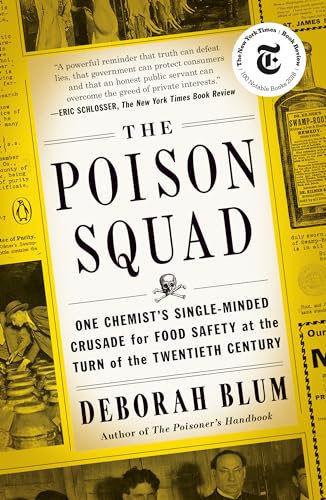The Poison Squad
One Chemist's Single-Minded Crusade for Food Safety at the Turn of the TwentiethCentury
Deborah Blum
BOOK REVIEW

The Poison Squad: One Chemist's Single-Minded Crusade for Food Safety at the Turn of the Twentieth Century is not merely a recounting of historical events; it's a vivid plunge into a time when food safety was an afterthought, a dangerous gamble for countless Americans. Deborah Blum spins an unforgettable narrative that revolves around the relentless efforts of a chemist named Harvey Wiley, who battled against an overwhelming tide of corporate greed and societal negligence.
Wiley's crusade is both a gripping drama and a harrowing reflection on the appetites of a burgeoning nation desperate for progress. As you traverse the pages of this incredible work, you're immediately thrust into an era defined by industrialization, where the slogan "Safety First" was mocked and where the line between innovation and corruption was perilously thin. Blum's meticulous research gives life to this tumultuous backdrop, illuminating the dark corners of the food industry that are echoed in today's conversations about health, sustainability, and consumer protection.
It's thrilling to witness how Wiley, a gentleman imbued with scientific rigor, emerges as a David against the Goliath of food manufacturers, many of whom dabbled in deadly chemicals to enhance appearance and flavor. The stark reality unfolds as Blum unveils the sinister practices that plagued the era: the use of formaldehyde in milk, lead in candy, and the maddeningly pervasive use of poisonous additives, all cloaked behind a veneer of trust. How utterly terrifying is the thought that what many consumed without question could be laced with deceit and danger?
The heart of The Poison Squad lies in Wiley's audacious experiments, notably the infamous "Poison Squad," a group of volunteers who consumed meals laced with various toxic substances in the name of food safety. This experiment was groundbreaking and, arguably, chilling in its implications. As Blum paints these experiments with her engaging prose, you can almost hear the clinking of dishes and the murmur of anxious spectators holding their breath. Would these brave souls emerge unscathed or fall victim to the very industry designed to nourish them? The emotional stakes are incredibly high, igniting a blend of horror and exhilaration within you.
What makes this narrative even more compelling is Blum's ability to seamlessly weave personal anecdotes with historical accounts. You're not only learning about policies and regulations; you're delving deep into the lives of those who fought for food safety. Their stories resonate on a personal level-people willing to risk their health in pursuit of justice, making their sacrifices all the more poignant and relatable. As their struggles unfold, it begs the question: Would you have the courage to stand up against injustice when your life and the lives of others are on the line?
Readers of The Poison Squad have varied responses, reflecting the diverse emotions this book evokes. Some praise Blum for her gripping storytelling and thorough research, noting how she sheds light on an essential yet often overlooked chapter of American history. Others, however, critique the book's pacing, feeling that it slows in parts where scientific details overshadow the narrative's forward momentum. Yet, it's this very science that underpins the gravity of Wiley's work, reminding us how the trials of the past echo in the modern discussions about food safety and regulation.
Blum doesn't shy away from the darker aspects of her subject, compellingly arguing that the stakes of the battle for food safety continue today. Modern parallels jump off the pages, akin to warning signs in a storm. The consumer wars waged against corporations still resonate-our battle lines drawn not with swords, but with labels and ingredients. In this way, The Poison Squad serves as a call to action, a reminder of the power we hold as consumers and the necessity of vigilance in a world filled with competing interests.
In a society that revels in quick fixes and fast food, Blum's exploration is not only an extraordinary piece of detailing a historical struggle; it'a a rallying cry. It urges us to cherish the regulations we have today while vigilantly advocating for a safer, healthier future. When was the last time you paused to read a label? To question what's truly in your food?
As you read The Poison Squad, you may find yourself not just educated, but transformed-confronted by the stark reality that echoes from the 19th century to today. The book's call to awareness is powerful; it doesn't just inform, it compels action. Blum has crafted a narrative that isn't just meant to be read and shelved-it's one that demands to be discussed, dissected, and, most importantly, acted upon. This isn't merely history; it's a part of our living legacy.
So, will you heed the warnings of the past? Will you join the ranks of those who fight for a safer tomorrow? Grab a copy of The Poison Squad, dive into its pages, and let it transform your understanding of food safety. Your health-and perhaps that of future generations-depends on it. 🍽
📖 The Poison Squad: One Chemist's Single-Minded Crusade for Food Safety at the Turn of the TwentiethCentury
✍ by Deborah Blum
🧾 352 pages
2019
#poison #squad #chemists #single #minded #crusade #food #safety #turn #twentiethcentury #deborah #blum #DeborahBlum